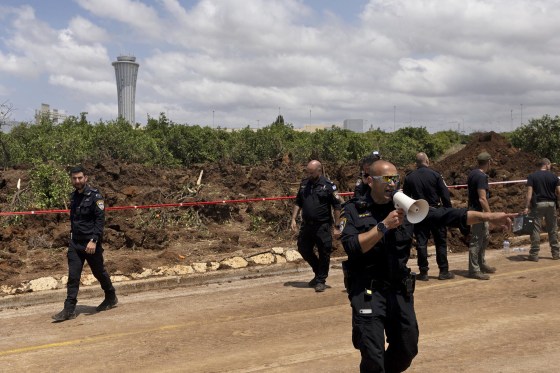The Israeli military said it carried out airstrikes against Yemen’s Hodeidah Port on Monday, a day after the Iran-aligned Houthis fired a missile that struck near Israel’s main airport.
The strikes injured at least 21 people, the Houthi-run health ministry spokesman Anees al-Asbahi said.
The Houthis shut down the area around the port and cement factory following the strikes, three sources said.
They said the extent of the damage at the port was unknown, yet the intensity of the strikes and fire caused severe damage to the containers’ berth.
Two other sources estimated the damage at 70% of the port’s five docks, warehouses and customs area. The strikes occurred as two ships were unloading their cargo, with traffic at the port at a complete standstill, a worker at the port said.
The port is the second-largest in the Red Sea after Aden and is the entry point for about 80% of Yemen’s food imports. More than 10 strikes targeted Hodeidah Port and the Al Salakhanah and Al Hawak neighborhoods in the city of Hodeidah, five residents told Reuters.
Four strikes also targeted a cement factory east of Hodeidah.
“The attack was carried out in response to repeated attacks carried out by the Houthi terrorist regime against the State of Israel in which surface-to-surface missiles and unmanned aircraft were launched at the territory of the state and its citizens,” the Israeli military said.
Israeli Prime Minister Benjamin Netanyahu vowed to retaliate for Sunday’s missile attack, which was the first known to have escaped interception by Israel’s air defenses in a series of attacks since March.
Houthi official Abdul Qader al-Mortada said in an X post commenting on the attack that Israel should wait for the “unimaginable”.
The Yemeni group resumed its attacks on Israel and shipping lanes following a brief suspension after the ceasefire between Hamas and Israel in Gaza ended.
The Houthis, who control Yemen, have been firing at Israel and shipping in the Red Sea since the beginning of the war between Israel and Hamas in Gaza, in what they say is solidarity with the Palestinians.
A U.S. official speaking on condition of anonymity said that U.S. forces were not actively involved in Monday’s strikes, but there is general coordination between the two allies, the official said.
Meanwhile, an oil company operated by the Houthis announced it has begun operating an emergency system for supplying cars with fuel, owing to difficulties in unloading cargo at the oil port of Ras Isa.
The company, in a statement, attributed the decision to U.S. strikes on the country, including the port.
U.S. President Donald Trump in March ordered large-scale strikes against the Houthis. The strikes have killed hundreds of people in Yemen while Israel has largely limited its strikes on Yemen since December last year.
Earlier on Monday, Israel approved a plan that may include seizing the Gaza Strip and controlling aid to the Palestinian enclave.
The war in Gaza started after Hamas-led attacks on southern Israel on October 7, 2023, in which 1,200 people were killed and 251 taken hostage, according to Israeli tallies. Israel’s offensive on Gaza has killed more than 52,000 Palestinians, Gaza health officials have said, and destroyed much of the enclave.
Netanyahu said in a video message the operation would be “intensive” and would see more Palestinians in Gaza moved “for their own safety.
He said Israeli troops would not follow previous tactics based on short raids by forces based outside Gaza. “The intention is the opposite,” he said, echoing comments from other officials who have said the country would hold on to the ground it has seized.
Israeli troops have already taken over an area amounting to around a third of Gaza, displacing the population and building watchtowers and surveillance posts on cleared ground the military has described as security zones, but the new plan would go further.
